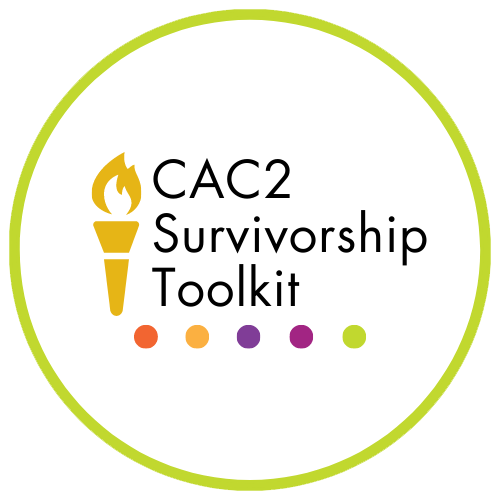

Empowered with important information – all in one place – families and survivors can better appreciate potential long-term side effects of the cancer experience for the entire family and learn what is possible to improve everyone’s quality of life.
Many families look forward to returning to their “normal” lives once their child’s cancer treatment is complete, only to find that life seems very different. Survivors -and their families- often have several issues to contend with post-treatment related to side effects, finances, family relationships, and the emotional impact on every member of the family. Due to the variety of treatments children need and its associated costs and stress, many families continue to deal with related issues long after treatment. The CAC2 Survivorship Toolkit draws together expertise from professionals and experienced advocates to create a dependable library of resources for survivors and their families to have current information readily available.
Select any of the six categories below to explore over 1,000 supportive resources for survivors and their families.
Resources authored by CAC2 Members are designated by ![]()
A comprehensive range of resources to help childhood cancer survivors and their families navigate educational challenges by addressing academic support needs, cognitive and learning difficulties, executive functioning, emotional well-being, school reintegration, and legal education rights through tools like IEPs and 504 Plans.
Guidance for childhood cancer survivors and families on managing insurance, appealing denials, accessing government aid, handling medical debt, and planning financially to reduce the long-term economic impact of survivorship.
Essential information on managing long-term health complications resulting from cancer treatments, including cognitive impairments, fertility issues, organ system damage, chronic conditions, and secondary cancers, emphasizing the importance of ongoing medical follow-up and personalized care plans to mitigate these late effects.
Resources to navigate the emotional and relational challenges that often persist after treatment, addressing topics such as resilience, relationship dynamics, coping strategies, and the impact of cancer on family and social connections, with guidance on fostering healing and maintaining well-being during the transition to survivorship.
Navigate the complexities of maturing into adulthood, focusing on developing independence, managing daily living tasks, pursuing education and employment, and transitioning from pediatric to adult healthcare, all while addressing the unique challenges posed by late effects and fostering self-advocacy skills.
Resources to maintain long-term health through balanced nutrition, regular physical activity, effective pain management, and strategies to address cognitive and executive function challenges, promoting overall well-being and quality of life post-treatment.
The cancer experience forever changes the lives of survivors and their families, who must adjust to its physical, emotional, and social consequences. This burden may be considerable and underscores the critical need to support survivors at risk for, or living with, late effects of childhood cancer. Understanding personal cancer and treatment risks is critical to guiding decision-making related to participation in medical follow-up and healthy behaviors that can reduce chronic disease risk and preserve health. The CAC2 Survivorship Toolkit includes information and resources to manage physical and psychosocial late effects of childhood cancer that survivors commonly face.
Melissa M. Hudson, MD, FASCO, Director, Survivorship Division St. Jude Children’s Research Hospital
The CAC2 Survivorship Toolkit provides information created by professionals in their fields. The Coalition Against Childhood Cancer (CAC2) does not own any content unless expressly stated. Information found in the CAC2 Survivorship Toolkit is not intended to replace the recommendations of a medical/psychological professional. Please consult with your physician about medical information regarding specific circumstances.
